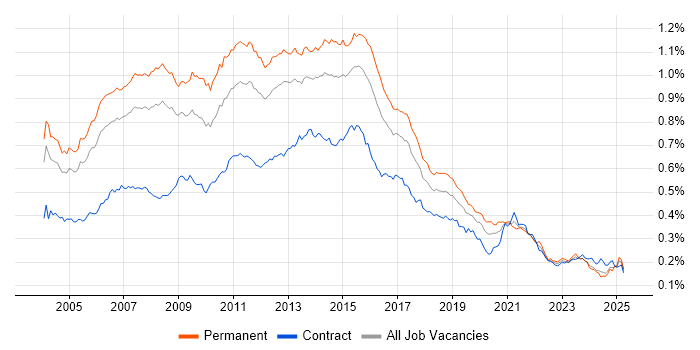SQL Analyst
UK
The median SQL Analyst salary in the UK is £44,000 per year, according to job vacancies posted during the 6 months leading to 1 May 2025.
The table below provides salary benchmarking and summary statistics, comparing them to the same period in the previous two years.
| 6 months to 1 May 2025 |
Same period 2024 | Same period 2023 | |
|---|---|---|---|
| Rank | 589 | 713 | 804 |
| Rank change year-on-year | +124 | +91 | -31 |
| Permanent jobs requiring a SQL Analyst | 103 | 183 | 185 |
| As % of all permanent jobs advertised in the UK | 0.20% | 0.19% | 0.18% |
| As % of the Job Titles category | 0.22% | 0.20% | 0.19% |
| Number of salaries quoted | 80 | 131 | 172 |
| 10th Percentile | - | £31,250 | £31,375 |
| 25th Percentile | £21,250 | £37,500 | £41,250 |
| Median annual salary (50th Percentile) | £44,000 | £60,000 | £55,000 |
| Median % change year-on-year | -26.67% | +9.09% | +10.00% |
| 75th Percentile | £61,563 | £80,000 | £70,000 |
| 90th Percentile | £71,250 | £112,500 | £80,000 |
| UK excluding London median annual salary | £37,500 | £40,000 | £42,500 |
| % change year-on-year | -6.25% | -5.88% | +6.25% |
All Permanent IT Job Vacancies
UK
For comparison with the information above, the following table provides summary statistics for all permanent IT job vacancies. Most job vacancies include a discernible job title that can be normalized. As such, the figures in the second row provide an indication of the number of permanent jobs in our overall sample.
| Permanent vacancies in the UK with a recognized job title | 46,902 | 93,183 | 95,132 |
| % of permanent jobs with a recognized job title | 90.12% | 94.62% | 91.53% |
| Number of salaries quoted | 27,275 | 66,883 | 59,840 |
| 10th Percentile | £30,000 | £28,500 | £32,500 |
| 25th Percentile | £42,000 | £38,500 | £45,000 |
| Median annual salary (50th Percentile) | £57,500 | £52,777 | £60,000 |
| Median % change year-on-year | +8.95% | -12.04% | - |
| 75th Percentile | £75,000 | £71,250 | £81,250 |
| 90th Percentile | £97,500 | £90,000 | £100,000 |
| UK excluding London median annual salary | £52,000 | £50,000 | £52,500 |
| % change year-on-year | +4.00% | -4.76% | +5.00% |
SQL Analyst
Job Vacancy Trend
Job postings that featured SQL Analyst in the job title as a proportion of all IT jobs advertised.

SQL Analyst
Salary Trend
3-month moving average salary quoted in jobs citing SQL Analyst.
SQL Analyst
Salary Histogram
Salary distribution for jobs citing SQL Analyst over the 6 months to 1 May 2025.
SQL Analyst
Top 14 Job Locations
The table below looks at the demand and provides a guide to the median salaries quoted in IT jobs citing SQL Analyst within the UK over the 6 months to 1 May 2025. The 'Rank Change' column provides an indication of the change in demand within each location based on the same 6 month period last year.
| Location | Rank Change on Same Period Last Year |
Matching Permanent IT Job Ads |
Median Salary Past 6 Months |
Median Salary % Change on Same Period Last Year |
Live Jobs |
|---|---|---|---|---|---|
| England | +133 | 100 | £44,500 | -28.80% | 10 |
| UK excluding London | +168 | 68 | £37,500 | -6.25% | 6 |
| Midlands | +115 | 34 | £43,500 | +52.63% | 3 |
| London | +71 | 34 | £67,500 | -10.00% | 4 |
| Work from Home | +153 | 28 | £44,750 | -29.53% | 10 |
| North of England | +93 | 24 | £22,500 | -40.00% | 1 |
| East Midlands | - | 23 | £45,000 | - | |
| West Midlands | +60 | 11 | £43,000 | +50.88% | 3 |
| North West | +30 | 9 | £22,500 | -40.00% | |
| Yorkshire | +79 | 8 | £22,500 | -28.57% | 1 |
| North East | - | 7 | £22,500 | - | |
| East of England | +55 | 5 | £47,500 | +5.56% | |
| South East | +83 | 3 | £55,000 | +37.50% | 2 |
| Scotland | +129 | 2 | £38,000 | +8.57% |
SQL Analyst Skill Set
Top 30 Co-occurring Skills and Capabilities
For the 6 months to 1 May 2025, SQL Analyst job roles required the following skills and capabilities in order of popularity. The figures indicate the absolute number co-occurrences and as a proportion of all permanent job ads featuring SQL Analyst in the job title.
|
|
SQL Analyst Skill Set
Co-occurring Skills and Capabilities by Category
The follow tables expand on the table above by listing co-occurrences grouped by category. The same employment type, locality and period is covered with up to 20 co-occurrences shown in each of the following categories:
|
|
||||||||||||||||||||||||||||||||||||||||||||||||||||||||||||||||||||||||||||||||||||
|
|
||||||||||||||||||||||||||||||||||||||||||||||||||||||||||||||||||||||||||||||||||||
|
|
||||||||||||||||||||||||||||||||||||||||||||||||||||||||||||||||||||||||||||||||||||
|
|
||||||||||||||||||||||||||||||||||||||||||||||||||||||||||||||||||||||||||||||||||||
|
|
||||||||||||||||||||||||||||||||||||||||||||||||||||||||||||||||||||||||||||||||||||
|
|
||||||||||||||||||||||||||||||||||||||||||||||||||||||||||||||||||||||||||||||||||||
|
|
||||||||||||||||||||||||||||||||||||||||||||||||||||||||||||||||||||||||||||||||||||
|
|
||||||||||||||||||||||||||||||||||||||||||||||||||||||||||||||||||||||||||||||||||||
|
|||||||||||||||||||||||||||||||||||||||||||||||||||||||||||||||||||||||||||||||||||||
